
Reviews
10 Resources to Support Your Organising This Summer
Books, podcasts, films and guides recommended by the Act Build Change team.
Act Build Change | 23 Jun 2025
Stories of community-powered change
Insights and ideas for transformative organising.
Showing 1 to 6 of 80 ideas | Page 1 of 14

Reviews
Books, podcasts, films and guides recommended by the Act Build Change team.
Act Build Change | 23 Jun 2025

Learning
Insights from the UK launch of Marshall Ganz's new book, People Power Change, and discussion hosted by Act Build Change.
Act Build Change | 28 May 2025

News
Join our Coaching Pod to improve your organising and work through problems with experts and peers.
Ariel Whitson | 3 Apr 2025

News
Check out our brand new courses to help you set effective boundaries and coach others to success!
Act Build Change | 21 Mar 2025

Learning
How to approach safety in facilitation and co-create supportive environments.
Kennedy Walker | 19 Feb 2025

Learning
Act Build Change expanded its community power in 2024, developing partnerships and training with hundreds of organisers across the UK.
Stephanie Wong | 27 Jan 2025